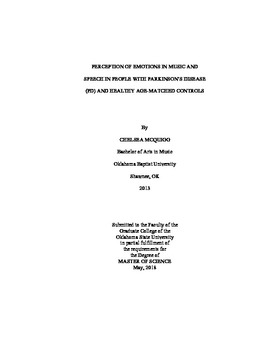| dc.contributor.advisor | Kaipa, Ramesh | |
| dc.contributor.author | McQuigg, Chelsea | |
| dc.date.accessioned | 2019-03-29T15:39:58Z | |
| dc.date.available | 2019-03-29T15:39:58Z | |
| dc.date.issued | 2018-05-01 | |
| dc.identifier.uri | https://hdl.handle.net/11244/317819 | |
| dc.description.abstract | People with Parkinson's disease (PD) often present with emotional perception deficits. Prior studies provide support that these deficits are seen in the processing of verbal as well as non-verbal emotions. The current study compared the perception of emotions (e.g., happy, angry, and sad) as they occurred in music and speech stimuli among people with PD and healthy age-matched controls. Results indicated that people with PD perceived emotions less accurately than healthy controls. Anger was identified with significantly more accuracy than sadness and happiness. In addition, accuracy of identification in music was more accurate than speech in people with PD. The results of the study suggest that perception of emotions may be modality specific, or limited only to speech in people with PD. | |
| dc.format | application/pdf | |
| dc.language | en_US | |
| dc.rights | Copyright is held by the author who has granted the Oklahoma State University Library the non-exclusive right to share this material in its institutional repository. Contact Digital Library Services at lib-dls@okstate.edu or 405-744-9161 for the permission policy on the use, reproduction or distribution of this material. | |
| dc.title | Perception of Emotions in Music and Speech in People with Parkinson's Disease (PD) and Healthy Age-Matched Controls | |
| dc.contributor.committeeMember | Copeland, Karen Annette | |
| dc.contributor.committeeMember | Giddens, Cheryl L. | |
| osu.filename | McQuigg_okstate_0664M_15673.pdf | |
| osu.accesstype | Open Access | |
| dc.description.department | Communication Sciences and Disorders | |
| dc.type.genre | Thesis | |
| dc.type.material | text | |
